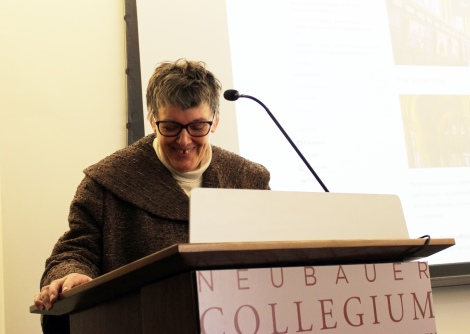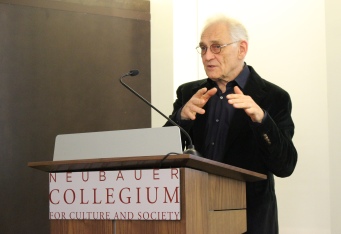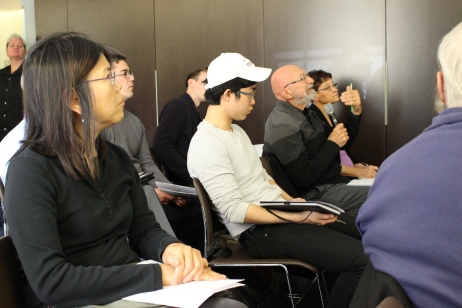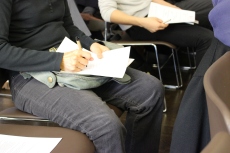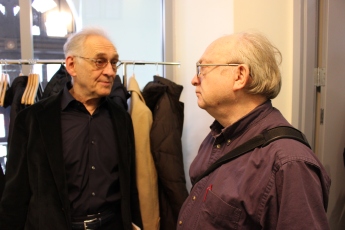
It is not true that every time I act justly, or honestly, or generously, or courageously, the goodness of what I do somehow ripples out to touch every human being. Rather, the cultivation and exercise of virtue enables me to participate fully in the intentional production and reproduction of sound modes of human social life in light of the nature I share with all of my fellow human beings. In my previous post I discussed how the cultivation and exercise of virtue in this way enables individual human beings to share in human social life ordered to the collective pursuit of the highest good humans can secure, promote, and protect, individually and collectively. Indeed, the cultivation and exercise of acquired virtue actualizes and expresses the best human beings can manage under their own steam. On this understanding, there is no problem about demonstrating the sense in which I can do right by (or wrong) a fellow human being with whom I have nothing else in common. That we are fellow human beings suffices to make it possible for us to interact justly or unjustly.[1]
In both Aristotle’s understanding of the political and social dimensions of the cultivation and exercise of virtue and Aquinas’s expansion of the significance and reach of virtue to the human community more generally (through an account of human nature and our place in creation), we find accounts of virtue as inherently bound to understandings of human good that outstrip the good of personal achievement, self-expression, and whatever might conduce to merely individual satisfaction in life. In this sense, both of these varieties of virtue ethics point to aspects of what contemporary empirical research treats under the rubric of “self-transcendence.” Virtue in both Aquinas and Aristotle requires modes of self-improvement and personal development that are inherently self-transcendent. The cultivation and exercise of virtue turns on intrapersonal coordination that enables individuals to participate in the production and reproduction of sound modes of social life by directing their efforts to common good. “Self-transcendence” in this connection signals practical orientation to an overall good that an individual cannot attain alone, the benefits of which go beyond measures of personal welfare or the welfare of the virtuous person’s own immediate family, circle of friends, or other small community.
Some contemporary empirical research on self-transcendence comes close to being research on these aspects of practical orientation to overall good. In their classification of virtues (understood as “signature strengths”), Christopher Peterson and Martin Seligman treat appreciation of beauty, gratitude, hope, humor, and spirituality as “Strengths of Transcendence.”[2] They explain the grouping this way:
The common theme running through these strengths of transcendence is that each allows individuals to forge connections to the larger universe and thereby provide meaning to their lives. Almost all the positive traits in our classification reach outside the individual—character, after all, is social in nature—but in the case of the transcendence strengths, the reaching goes beyond other people per se to embrace part or all of the larger universe. The prototype of this strength category is spirituality, variously defined but always referring to a belief in and commitment to the transcendent (nonmaterial) aspects of life—whether they be called universal, ideal, sacred, or divine. How do the other strengths classified approach this prototype? Appreciation of beauty is a strength that connects someone directly to excellence. Hope connects someone directly to the dreamed-of future. Humor—admittedly the most controversially placed entry—connects someone directly to troubles and contradictions in a way that produces not terror or anger but pleasure.[3]
One of the strong points of the Peterson-Seligman classification system is its emphasis on the ways in which virtues orient their bearers to distinctively human goods. As they understand the category, transcendence virtues orient their bearers to immaterial goods available to human experience and at issue in some of our activities. Presumably, a material connection to the troubles and contradictions heighted by humor brings negative, rather than positive, emotional states. A material orientation to the future will have less to do with dreams and more to do with live options and the means available to realize these. If I understand them, the kind of orientation to beauty or excellence that they see as transcendent is one that is detached from personal desires or goals and is, to that extent, immaterial. And their understanding of spirituality has more to do with the cosmos as a whole (or some sacred or divine aspect of the cosmos) than my relation to myself and my fellow human beings. In a sense, Aquinas also understands virtue in terms of human orientation to human good. Aquinas’s approach, however, is unlike the work on virtue found in positive psychology.
As a theologian who understands natural law as our participation in eternal law, and acquired virtues as equipping us to participate in collective pursuit of human good (in light of our nature as creatures), Aquinas of course sees human life in relation to creation in general and to the divine. For all that, he recognized pagan virtue[4] and did not classify virtues in quite the way suggested by research informed by the Peterson and Seligman scheme.[5] Aquinas, like Aristotle, held that the acquired virtues form a unity—no one of them can operate fully as a virtue in isolation from the others—and all such strengths of character operate in the context of self-transcendence, not as a transcendence of the human, but as enabling the fullest expression of the human that we can manage under our own steam. Virtues, for Aquinas, are self-transcendent strengths that promote inwardly and outwardly harmonious, reasonable pursuit of the good that it belongs to rational animals to pursue. There is nothing especially immaterial (in the Peterson-Seligman sense of that term) in the cultivation and exercise of virtue, where the immaterial is understood as properly distinct from the sphere of thought, feeling, action, and response to the social world in which we find ourselves. The common good at issue in virtuous activity for Aquinas is not something other than our concrete, collective pursuit of good (material or immaterial) from one generation to the next.
Transcendence in Positive Psychology[1]
[1] I am grateful to Liz Gulliford at the Jubilee Centre for Character and Virtues for urging me to address the place of transcendence in positive psychology and for letting me read her doctoral thesis, An Interdisciplinary Evaluation and Theological Enrichment of Positive Psychology.
[1] On Michael Thompson’s diagnosis, the hurdle that such a neo-Aristotelian account must surmount is epistemological—we need a good story about how the human being comes to recognize what he owes fellow human beings simply in virtue of their shared human nature. Again, Aquinas’s response to this difficulty takes us into the heart of his account of the way in which the natural law is promulgated to us in and by nature. Again, Stephen Brock’s account offers what I take to be exactly the sort of story needed for Thomist neo-Aristotelianism to meet the challenge Thompson sets for any account of justice. For the challenge, see Thompson, “What is it to Wrong Someone? A Puzzle about Justice,” pp. 376-379. For Brock’s account see The Legal Character of Natural Law According to St. Thomas Aquinas, pp. 96-175.
[2] Christopher Peterson and Martin Seligman, Character Strengths and Virtues: A Handbook and Classification, (Oxford: Oxford University Press, 2004).
[3] Christopher Peterson and Martin Seligman, Character Strengths and Virtues: A Handbook and Classification, p. 519.
[4] See, e.g., Angela McKay Knobel, “Aquinas and the Pagan Virtues,” International Philosophical Quarterly, Vol. 51 (2011): 339-354.
[5] Some such research treats “transcendence” as a category of virtues; other research treats “transcendence” as the name of a distinctive virtue. Neither use of the term corresponds with self-transcendence in the way that seems most in keeping with Aquinas’s understanding of virtue.
Candace Vogler is the David B. and Clara E. Stern Professor of Philosophy and Professor in the College at the University of Chicago, and Director and Principal Investigator for Virtue, Happiness, & the Meaning of Life.

 animal. And he who by nature and not by mere accident is without a state is either a bad man or… he is like the ‘Tribeless, lawless, hearthless one,’ whom Homer denounces—the natural outcast…. Nature, as we often say, makes nothing in vain, and man is the only animal who has the gift of speech. And whereas mere voice is but an indication of pleasure and pain, and is therefore found in other animals…the power of speech is intended to set forth the expedient and inexpedient, and therefore likewise the just and unjust. And it is a characteristic of man that he alone has any sense of good and evil, of just and unjust, and the like, and the association of living beings who have this sense makes a family and a state.
animal. And he who by nature and not by mere accident is without a state is either a bad man or… he is like the ‘Tribeless, lawless, hearthless one,’ whom Homer denounces—the natural outcast…. Nature, as we often say, makes nothing in vain, and man is the only animal who has the gift of speech. And whereas mere voice is but an indication of pleasure and pain, and is therefore found in other animals…the power of speech is intended to set forth the expedient and inexpedient, and therefore likewise the just and unjust. And it is a characteristic of man that he alone has any sense of good and evil, of just and unjust, and the like, and the association of living beings who have this sense makes a family and a state. The polis is the natural setting for virtuous activity in Aristotle, and even though there is no question that Aristotle sees virtuous citizens as working for the good of the polis, it is not clear how far Aristotle’s understanding of virtue and sound practical reason locates these excellences as aimed, first and foremost, at the good of the community rather than at the virtuous person’s own good (even if participation in ordered community life is required if individuals are to thrive). It is one thing to hold that an individual human being’s good cannot be understood in isolation from that individual’s participation in an ordered community. As near as I can tell, Aristotle thought as much. It is quite another to treat the proper end of virtuous activity as the common good understood very broadly—as extending, for example, beyond the boundaries of the polis, of political friendships, of a community ordered by shared customs or rules, of humans who share a common language, beyond, even the reach of norms enjoining hospitality. Notoriously, Aristotle has little to offer on the question of how individuals who are in these respects strangers to one another are capable of doing right or wrong by each other.
The polis is the natural setting for virtuous activity in Aristotle, and even though there is no question that Aristotle sees virtuous citizens as working for the good of the polis, it is not clear how far Aristotle’s understanding of virtue and sound practical reason locates these excellences as aimed, first and foremost, at the good of the community rather than at the virtuous person’s own good (even if participation in ordered community life is required if individuals are to thrive). It is one thing to hold that an individual human being’s good cannot be understood in isolation from that individual’s participation in an ordered community. As near as I can tell, Aristotle thought as much. It is quite another to treat the proper end of virtuous activity as the common good understood very broadly—as extending, for example, beyond the boundaries of the polis, of political friendships, of a community ordered by shared customs or rules, of humans who share a common language, beyond, even the reach of norms enjoining hospitality. Notoriously, Aristotle has little to offer on the question of how individuals who are in these respects strangers to one another are capable of doing right or wrong by each other.






